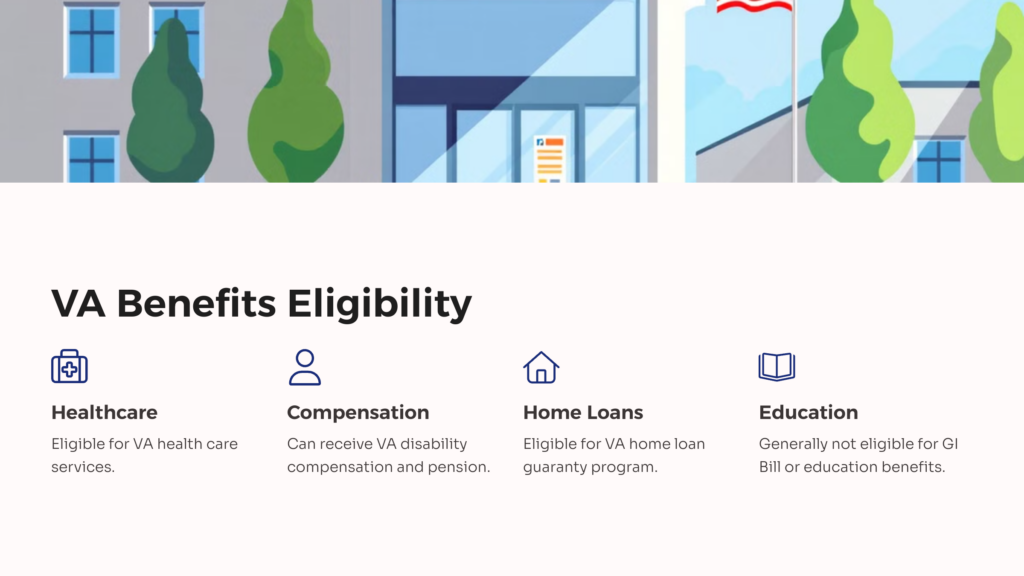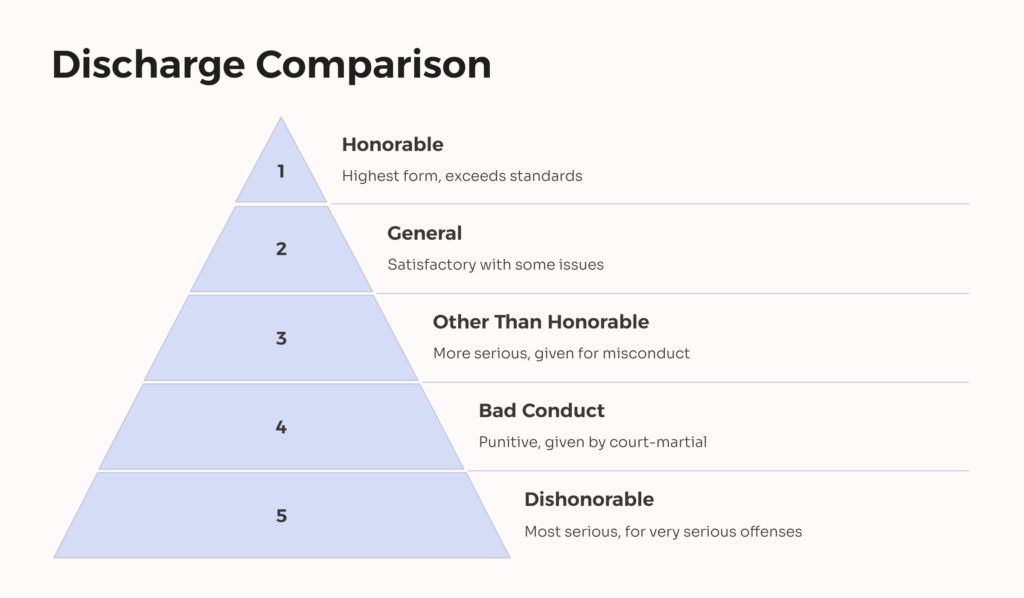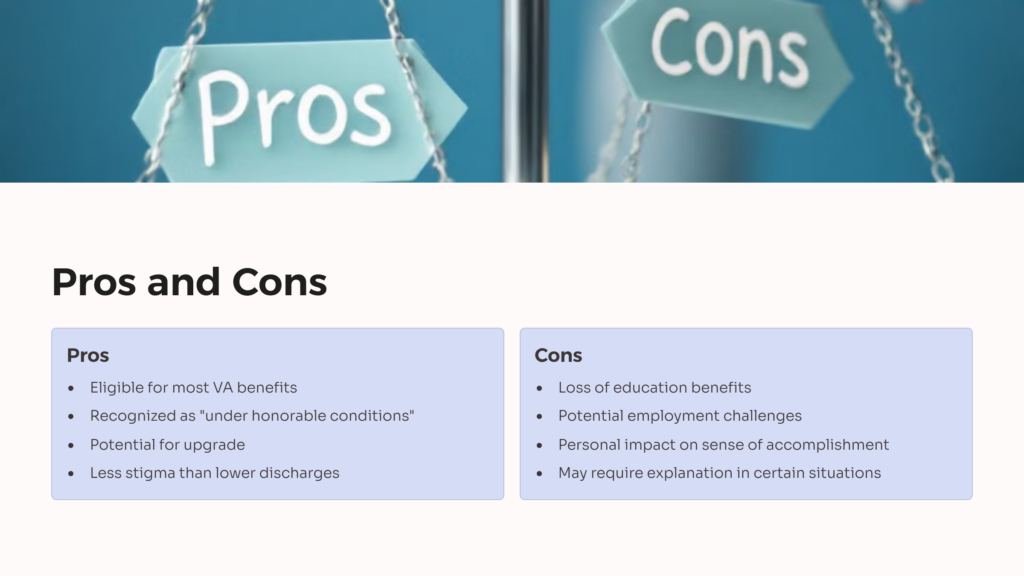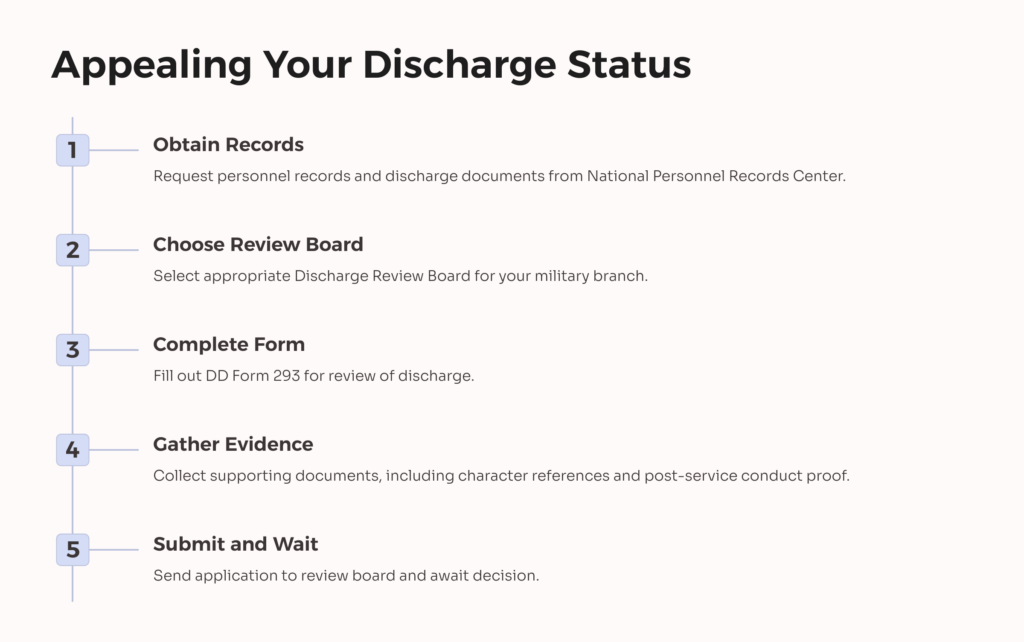A General Discharge Under Honorable Conditions, often simply called a General Discharge, is a type of military separation that falls between an Honorable Discharge and an Other Than Honorable Discharge. This type of discharge is given to service members who have served satisfactorily but have had some issues during their time in the military.
Typically, a General Discharge is given when a service member’s performance and conduct have been generally good, but there have been some significant departures from the expected standards. These issues might include minor disciplinary infractions, failure to meet certain military standards, or other concerns that don’t warrant a more severe discharge.
It’s important to note that a General Discharge is still considered to be under “honorable conditions.” This means that while it’s not the highest form of discharge, it’s not considered punitive or negative in the same way as other types of discharges.
Eligibility for VA Benefits With a General Discharge

One of the most common concerns for veterans with a General Discharge is how it affects their eligibility for Veterans Affairs (VA) benefits. The good news is that in many cases, a General Discharge still allows access to most VA benefits.
According to the VA’s official guidelines, veterans with a General Discharge are typically eligible for:
- VA health care
- VA disability compensation
- VA pension
- VA home loan guaranty
- Burial and memorial benefits
However, there is one significant exception: education benefits. Veterans with a General Discharge are usually not eligible for the GI Bill or other VA education benefits. This is one of the main differences between a General Discharge and an Honorable Discharge.
It’s also worth noting that in some cases, the VA may conduct a “character of discharge” review to determine eligibility for benefits. This is more common with Other Than Honorable discharges but can sometimes apply to General Discharges as well.
Impact on Employment and Career Opportunities
When it comes to employment, a General Discharge can have both positive and negative impacts. On the positive side, it’s still considered a discharge under honorable conditions, which means it doesn’t carry the same stigma as Other Than Honorable or Dishonorable Discharges.
Many employers, especially those not closely connected to the military, may not even ask about the specific type of discharge. If they do, a General Discharge is generally seen as acceptable, especially if the veteran can explain any circumstances that led to it.
However, there can be some drawbacks:
- Some employers, particularly those with strong military connections or government contractors, may prefer candidates with Honorable Discharges.
- Certain jobs that require high-level security clearances might be more difficult to obtain with a General Discharge.
- If the reasons for the General Discharge are related to job performance or conduct, they might raise concerns for potential employers.
It’s important for veterans with General Discharges to be prepared to discuss their military service positively, focusing on their achievements and skills gained, while being honest about any challenges they faced.
How Does a General Discharge Compare to Other Discharges?

Understanding how a General Discharge compares to other types of military discharges can help put things in perspective. Here’s a brief overview:
1. Honorable Discharge: This is the highest form of discharge. It means the service member met or exceeded the required standards of duty performance and personal conduct.
2. General Discharge Under Honorable Conditions: As we’ve discussed, this is given for satisfactory service with some significant departures from expected standards.
3. Other Than Honorable Discharge: This is more serious and usually given for misconduct, security violations, or other significant negative actions.
4. Bad Conduct Discharge: This is a punitive discharge given by a court-martial for bad conduct.
5. Dishonorable Discharge: The most serious type, given only by a general court-martial for very serious offenses.
A General Discharge sits in the middle of this spectrum. It’s not as positive as an Honorable Discharge, but it’s significantly better than the lower three types. This middle ground status is why it comes with most, but not all, veteran benefits
The GI Bill and Education Benefits: What’s Affected?
One of the most significant drawbacks of a General Discharge is its impact on education benefits, particularly the GI Bill. This is often a major concern for veterans planning to pursue further education after their military service.
Veterans with a General Discharge are typically not eligible for:
- Post-9/11 GI Bill
- Montgomery GI Bill
- Veterans Educational Assistance Program (VEAP)
- Other VA education benefits
This loss of education benefits can be a significant financial setback for many veterans. However, it’s important to note that there are still options available:
- Some states offer education benefits for veterans that may be accessible with a General Discharge.
- Many colleges and universities have their own programs to support veterans, regardless of discharge type.
- There are numerous scholarships and grants specifically for veterans that don’t always require an Honorable Discharge.
While the loss of GI Bill benefits is a serious con of a General Discharge, it doesn’t necessarily mean the end of educational opportunities. It just may require more research and alternative funding sources.

Pros of Receiving a General Discharge
While a General Discharge isn’t the ideal outcome for military service, it does come with several advantages:
1. Eligibility for most VA benefits: As mentioned earlier, veterans with General Discharges can still access most VA benefits, including health care, disability compensation, and home loan guarantees.
2. Recognized as “under honorable conditions”: This classification means that overall, the military views the service as satisfactory, which can be important for future opportunities and personal pride.
3. Potential for upgrade: Unlike lower forms of discharge, a General Discharge has a higher chance of being upgraded to an Honorable Discharge if appealed.
4. Less stigma than lower discharges: When it comes to employment and other areas of civilian life, a General Discharge is generally viewed much more favorably than Other Than Honorable, Bad Conduct, or Dishonorable Discharges.
These pros can provide significant support and opportunities for veterans as they transition to civilian life, despite the challenges that come with a General Discharge.
Cons of Receiving a General Discharge
While there are some positives, it’s important to be aware of the drawbacks of a General Discharge:
1. Loss of education benefits: As discussed, this is often the most significant con, as it can impact future career and personal development plans.
2. Potential employment challenges: Some employers, especially those with military connections, may view a General Discharge less favorably than an Honorable Discharge.
3. Personal impact: For many veterans, not receiving an Honorable Discharge can be emotionally difficult and may affect their sense of accomplishment regarding their military service.
4. Explanation needed: In situations where discharge type is relevant (job applications, VA benefit applications, etc.), veterans may need to explain the circumstances of their General Discharge, which can be uncomfortable.
5. Security clearance issues: For jobs requiring high-level security clearances, a General Discharge might present additional hurdles.
Understanding these cons can help veterans better prepare for potential challenges and seek appropriate resources and support.
How to Appeal or Upgrade Your Discharge Status

For veterans who believe their General Discharge was unfair or who have shown significant positive conduct since their discharge, there is a process to appeal for an upgrade. Here are the basic steps:
1. Obtain your military records: Request your personnel records and discharge documents from the National Personnel Records Center.
2. Choose the appropriate review board: Each military branch has its own Discharge Review Board.
3. Complete DD Form 293: This is the application for review of discharge from the armed forces of the United States.
4. Gather supporting evidence: This might include character references, proof of positive post-service conduct, or evidence that the original discharge was inequitable or improper.
5. Submit your application: Send your completed form and supporting documents to the appropriate review board.
6. Attend a hearing (optional): You can request a hearing to present your case in person.
7. Wait for the decision: The board will review your case and make a decision.
Remember, the process can be complex and time-consuming. Many veterans find it helpful to work with a Veterans Service Organization or a lawyer experienced in military law for assistance.
Legal Insights: Navigating the Discharge Process
Understanding the legal aspects of military discharges can be crucial for veterans dealing with a General Discharge. Here are some key points to keep in mind:
- The Uniform Code of Military Justice (UCMJ) governs the discharge process. Familiarizing yourself with the relevant sections can help you understand your rights.
- Each case is unique. The specific reasons for a General Discharge can vary widely and can affect potential appeals or benefit eligibility.
- There are time limits for appeals. Generally, you have 15 years from the date of discharge to apply for a discharge upgrade.
- The “liberal consideration” policy, implemented in 2014, requires review boards to give special consideration to veterans with mental health conditions or who experienced sexual assault during service.
If you’re considering appealing your discharge or are unsure about your rights, it may be beneficial to consult with a lawyer specializing in military law. Many offer free initial consultations to veterans.
Resources for Veterans Seeking Assistance
Fortunately, there are numerous resources available to help veterans navigate the challenges of a General Discharge:
1. Veterans Service Organizations (VSOs): Organizations like the American Legion, Veterans of Foreign Wars (VFW), and Disabled American Veterans (DAV) offer free assistance with VA claims and discharge upgrades.
2. VA Vet Centers: These community-based counseling centers provide a wide range of social and psychological services to veterans and their families.
3. State Veterans Affairs Offices: Many states have their own VA offices that can provide local assistance and resources.
4. Veterans Employment Centers: These centers, often associated with local job services offices, can help with job searches and career counseling.
5. Veterans Justice Outreach Program: This program can help veterans who have had encounters with the criminal justice system.
6. National Veterans Legal Services Program: This organization provides free legal representation to veterans seeking discharge upgrades.
Remember, you’re not alone in this process. Don’t hesitate to reach out to these organizations for support and guidance. With the right resources and persistence, many veterans have successfully navigated the challenges of a General Discharge and gone on to lead fulfilling civilian lives.
 AllVeteran.com Advisors
AllVeteran.com Advisors
With expertise spanning local, state, and federal benefit programs, our team is dedicated to guiding individuals towards the perfect program tailored to their unique circumstances.











